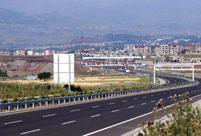 Beautiful Chinese-built roads in Africa
Beautiful Chinese-built roads in Africa Sagya Monastery in Tibet
Sagya Monastery in Tibet
 Young Chinese drive consumption
Young Chinese drive consumption
 The life of a model: Not as glamorous as it seems
The life of a model: Not as glamorous as it seems
 Hello Kitty, happy 40th birthday!
Hello Kitty, happy 40th birthday!
 The Western Qing Mausoleum
The Western Qing Mausoleum
 Avant-garde approach to graduation photos
Avant-garde approach to graduation photos
 Early PLA posters, signatures of an era
Early PLA posters, signatures of an era
 First Russian Street in Tianjin open to public
First Russian Street in Tianjin open to public
 Motorcycle stunt on the Bund
Motorcycle stunt on the Bund
TOKYO, May 7-- As Japanese Prime Minister Shinzo Abe steamrolls ahead with his signature dictum to allow Japanese forces the right to collective self-defense, some within the ruling Liberal Democratic Party-led (LDP) coalition believe that more time and debate is needed on the thorny issue.
In a tacit nod to the existence of a potential rift within the coalition bloc, Chief Cabinet Secretary Yoshihide Suga said Wednesday that the current Diet session ending in June may not be the official deadline for gaining the Cabinet's approval for lifting Japan's self-imposed ban on exercising the right to collective self-defense.
Suga told a press conference that, contrary to Abe's precipitateness, there was no particular time frame in mind for seeking approval and gaining more support from the ruling bloc needs to be prioritized.
Suga's remarks come as Abe has vowed to, if not rewrite, at least change the current interpretation of Japan's pacifist Constitution, to allow Japanese forces to engage in collective self-defense, or defend an ally under armed attack.
Currently, Article 9 of the Constitution forbids the use of force to settle international disputes, but Abe and his right- leaning administration believe that Japan has the right to collective self-defense under international law, but cannot exercise it due to the semantics or the way in which Article 9 is interpreted.
But Abe's New Komeito coalition ally is wary about hastily reinterpreting the Constitution and has called for more focus to first be devoted to clarifying the laws pertaining to a number of "grey zones" that the issue has thrown up.
Such scenarios include, for example, territorial intrusions that don't involve armed attacks, such as a foreign submarine rejecting an order to leave Japan's territorial waters. Other " grey zone" matters need to be thoroughly traversed in the current Diet session, before specific bills are discussed and LDP Secretary General Shigeru Ishiba, along with a number of LDP lawmakers, has said that these remain "high on the agenda."
It may be the case that the legacy that Abe so ardently wants to leave for Japan, despite public opinion being largely against constitutional change and the right to collective self-defense, may become a more protracted issue than Japan's hawkish premier had initially thought.
Abe commissioned a government panel on Sept. 17 to deliberate Japan's right to exercise collective self-defense and compile a report on the issue, which states that such a right would be permissible, only by changing the current interpretation of Japan' s pacifist Constitution, rather than revising it.
The advisory panel's chairperson, Shinichi Kitaoka, who oversaw the drafting of the report said that exercising the right to collective self-defense could "reduce the chances of armed conflict" and could "keep the level of military preparedness low" as compared to when a country defends itself.
The report also states that there is no "constitutional constraint against" exercising the right and that it is "not appropriate to set geographical limitations on the operations of the Self-Defense Forces."
It goes on to say however that Japan can only exercise the right to collective self-defense "when a close ally is under attack and that ally issues a clear request for help."
Any decision on whether to exercise the right would have to be made by the Cabinet and would also need to be approved by the Diet, the report states.
The panel has been discussing what roles and actions would be theoretically permissible if Japan were to reinterpret its current pacifist Constitution, including some of the "grey zones" that have become sticking points.
The draft report, to be submitted to the prime minister in mid- May, maintains that the current interpretation of the Constitution is invalid and open to reinterpretation, possibly without the need to make wholesale revisions to it, as Abe has been pushing for.
But both senior lawmakers from the LDP and the New Komeito party agreed Wednesday that further debate on the issue was needed and, for their part, the New Komeito party has voiced its concerns about such a radical change to Japan's decades-old, self-imposed pacifist stance.
Abe has conceded that he wishes to reach a consensus with his coalition ally, even if it takes time and beyond that any amendment to the constitution will require a two-thirds approval in both houses of parliament followed by a referendum.
Recent polls have shown mixed opinions to revising the constitution with a growing opposition over what is seen as the Abe government's attempt to force through the change, observers have said.
"The lifting of the ban on the collective defense is basically taking any remaining meaning out of Article 9, so in that sense it 's really going to be undermining the Constitution itself," Koichi Nakano, a political science professor at Sophia University in Tokyo said in a recent editorial on the matter.
But while Prime Minister Shinzo Abe has stressed that recent security protocol shifts, including easing the weapons export ban and increased military spending are in a bid for Japan to better contribute to global peace and security, concerns remain rife that Abe's right-leaning administration is acting against the nation's Constitution in a manner deemed combative.
Recent moves by Abe, including Japan's recent shift away from its weapons export embargo have been concerning a number of its neighboring countries and the wider international community, and leaves little doubt that the conservative leader wishes to be remembered in the future annals of Japanese political history as the prime minister who "lifted the nation's self-imposed ban on exercising the right to collective self-defense."
Such a pertinacious goal, however, makes a mockery of Article 9 of the Japanese Constitution, and of the millions of peace-loving citizens here who truly believe in the nation's long-held pacifistic ideology.
Moreover, Abe's goal, while stripping a nation of its pacifist identity, simultaneously serves to endanger the lives of the nation's citizens as their country remilitarizes and, for all intents and purposes, becomes "war ready."
 When we are young...
When we are young... Solar halo occurs in Lhasa
Solar halo occurs in Lhasa Photos give cheongsam a new life
Photos give cheongsam a new life Graduates bid farewell to campus in clown costume
Graduates bid farewell to campus in clown costume Badain Jaran Desert: Amazing curves of nature
Badain Jaran Desert: Amazing curves of nature Beautiful Chinese-built roads in Africa
Beautiful Chinese-built roads in Africa High fashion trend welcomed by costumers in Changsha
High fashion trend welcomed by costumers in Changsha About 100 cubs expected to be born in NE China's Siberian Tiger Garden
About 100 cubs expected to be born in NE China's Siberian Tiger Garden China wins 19th women's team title at table tennis worlds
China wins 19th women's team title at table tennis worlds The 'Chinese Dad'
The 'Chinese Dad' Chinese mountaineer's gear list
Chinese mountaineer's gear list  Newly recruited police in Hetian hold drill
Newly recruited police in Hetian hold drill  China's most luminous celebrities
China's most luminous celebrities Top 10 most expensive cars in the world
Top 10 most expensive cars in the world 'African Street' in Guangzhou
'African Street' in GuangzhouDay|Week|Month